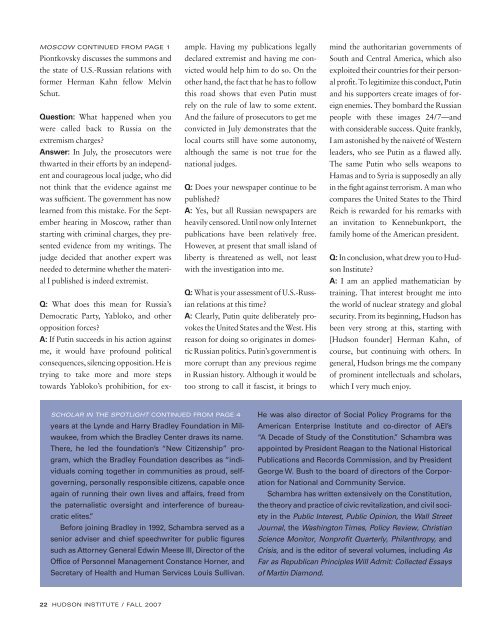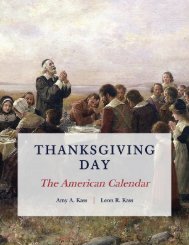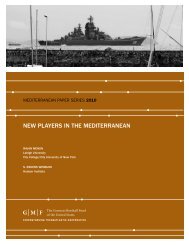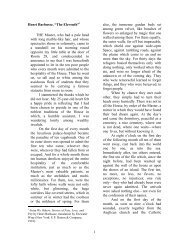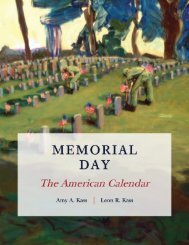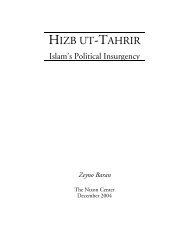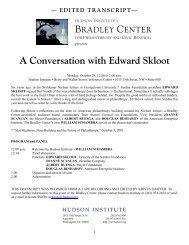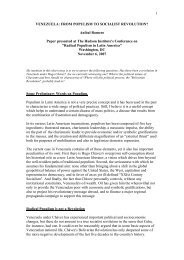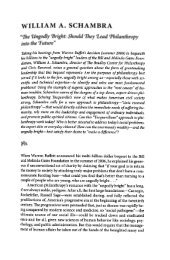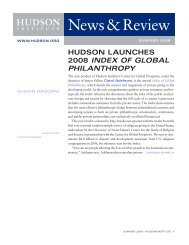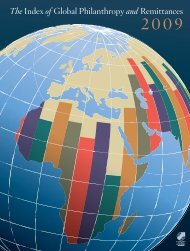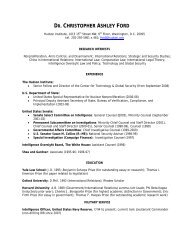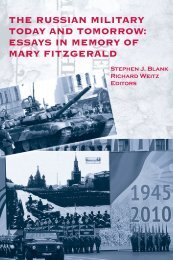You also want an ePaper? Increase the reach of your titles
YUMPU automatically turns print PDFs into web optimized ePapers that Google loves.
MOSCOW CONTINUED FROM PAGE 1<br />
Piontkovsky discusses the summons and<br />
the state of U.S.-Russian relations with<br />
for mer Herman Kahn fellow Melvin<br />
Schut.<br />
Question: What happened when you<br />
were called back to Russia on the<br />
extremism charges?<br />
Answer: In July, the prosecutors were<br />
thwarted in their efforts by an independent<br />
and courageous local judge, who did<br />
not think that the evidence against me<br />
was sufficient. The government has now<br />
learned from this mistake. For the Sept -<br />
em ber hearing in Mos cow, rather than<br />
starting with criminal charges, they presented<br />
evidence from my writings. The<br />
judge decided that another expert was<br />
needed to determine whether the material<br />
I published is indeed extremist.<br />
Q: What does this mean for Russia’s<br />
Democratic Party, Yabloko, and other<br />
opposition forces?<br />
A: If Putin succeeds in his action against<br />
me, it would have profound political<br />
consequences, silencing opposition. He is<br />
trying to take more and more steps<br />
towards Yabloko’s prohibition, for ex -<br />
ample. Having my publications legally<br />
declared ex tremist and having me convicted<br />
would help him to do so. On the<br />
other hand, the fact that he has to follow<br />
this road shows that even Putin must<br />
rely on the rule of law to some extent.<br />
And the failure of prosecutors to get me<br />
convicted in July demonstrates that the<br />
local courts still have some autonomy,<br />
although the same is not true for the<br />
national judges.<br />
Q: Does your newspaper continue to be<br />
published?<br />
A: Yes, but all Russian newspapers are<br />
heavily censored. Until now only Internet<br />
publications have been relatively free.<br />
However, at present that small island of<br />
liberty is threatened as well, not least<br />
with the investigation into me.<br />
Q: What is your assessment of U.S.-Russian<br />
relations at this time?<br />
A: Clearly, Putin quite deliberately provokes<br />
the United States and the West. His<br />
reason for doing so originates in domestic<br />
Russian politics. Putin’s government is<br />
more corrupt than any previous regime<br />
in Russian history. Although it would be<br />
too strong to call it fascist, it brings to<br />
mind the authoritarian governments of<br />
South and Central America, which also<br />
exploited their countries for their personal<br />
profit. To legitimize this conduct, Putin<br />
and his supporters create images of foreign<br />
enemies. They bombard the Russian<br />
people with these images 24/7—and<br />
with considerable success. Quite frankly,<br />
I am astonished by the naiveté of Western<br />
leaders, who see Putin as a flawed ally.<br />
The same Putin who sells weapons to<br />
Hamas and to Syria is supposedly an ally<br />
in the fight against terrorism. A man who<br />
compares the United States to the Third<br />
Reich is re warded for his remarks with<br />
an invitation to Kenne bunkport, the<br />
family home of the Ameri can president.<br />
Q: In conclusion, what drew you to <strong>Hudson</strong><br />
<strong>Institute</strong>?<br />
A: I am an applied mathematician by<br />
training. That interest brought me into<br />
the world of nuclear strategy and global<br />
security. From its beginning, <strong>Hudson</strong> has<br />
been very strong at this, starting with<br />
[<strong>Hudson</strong> founder] Herman Kahn, of<br />
course, but continuing with others. In<br />
general, <strong>Hudson</strong> brings me the company<br />
of prominent intellectuals and scholars,<br />
which I very much enjoy.<br />
SCHOLAR IN THE SPOTLIGHT CONTINUED FROM PAGE 4<br />
years at the Lynde and Harry Bradley Foundation in Mil -<br />
waukee, from which the Bradley Center draws its name.<br />
There, he led the foundation’s “New Citizenship” program,<br />
which the Bradley Foundation describes as “indi-<br />
vi d uals coming together in communities as proud, selfgoverning,<br />
personally responsible citizens, capable once<br />
again of running their own lives and affairs, freed from<br />
the paternalistic oversight and interference of bureaucratic<br />
elites.”<br />
Before joining Bradley in 1992, Schambra served as a<br />
senior adviser and chief speechwriter for public figures<br />
such as Attorney General Edwin Meese III, Director of the<br />
Office of Personnel Management Constance Horner, and<br />
Secretary of Health and Human Services Louis Sullivan.<br />
He was also director of Social Policy Programs for the<br />
American Enterprise <strong>Institute</strong> and co-director of AEI’s<br />
“A Decade of Study of the Constitution.” Schambra was<br />
appointed by President Reagan to the National Historical<br />
Publications and Records Commission, and by President<br />
George W. Bush to the board of directors of the Corpor -<br />
ation for National and Community Service.<br />
Schambra has written extensively on the Constitution,<br />
the theory and practice of civic revitalization, and civil society<br />
in the Public Interest, Public Opinion, the Wall Street<br />
Journal, the Washington Times, Policy Review, Christian<br />
Science Monitor, Nonprofit Quarterly, Philan thropy, and<br />
Crisis, and is the editor of several volumes, including As<br />
Far as Republican Principles Will Admit: Collected Essays<br />
of Martin Diamond.<br />
22 HUDSON INSTITUTE / FALL 2007


